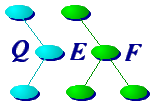
This page contains the slides of the presentation done at the Soviet Union Unix Group Conference, October, 1990.





|
These slides were presented at the Soviet Union Unix User Group Conference held in Moscow, Oct. 1990. This conference featured by a number of western speakers including:
Initially my talk was to have been the one that I had just given as the keynote address in Nice, namely Washing Behind Your Ears: The Principles of Software Hygiene. However, the talk was reformulated by a number of events:
Given these influences I reformulated my talk to include a corrected history of Unix to mention what I feel were two important events, that is the CACM paper and the Lions' Commentary, and to draw the parallels with Russian history. It also combined the two major themes of the conference: Vodka and Unix. It was an interesting time to be in Moscow -- Gorbachev was in power (the next week someone would take a shot at him in Red Square, the coup would not happen for another 10 months) and the infra-structure was still functional. The official rate of exchange was six rubles to the US dollar, although the unofficial rate was much higher -- see below. On arrival we were each given 125 rubles -- half a month's salary for a professor. We were able to buy lunch, dinner, and drinks for everyone. I still had 80 rubles when I was about to leave. Three years later it was 2,000 rubles to the dollar and Moscow had become the world's most expensive city to visit. Our hosts took us to Zagorsk to see the monastery which involved one of the most hair-raising rides of our lives. We westerners are not used to people stopped in the fast lane fixing their Ladas. We also tend to prefer drivers who do not look intently at you when they're talking to you -- even when you're in the back seat. But not to worry, he had had his driver's licence for six months as we were informed during the trip. On arrival we had the following exchange: Driver: I hope the trip wasn't too boring for you? It took Mike and me a few minutes to recover. Another interesting feature of the trip was a massive building near the monument to the cosmonauts. I didn't know what it was but it sure looked familiar. Neither Jaap nor Mike had any idea what it was, so I asked our driver: Driver: You've probably been in that building.It was the USSR pavilion at the World's fair in 1967 which had been brought back to Moscow. While in Zagorsk I saw some patrioskas ... you know like
matrioskas (little mothers)
Me: How much? That night after relating the above dialogue to others in the group, we visited Arbat St. where we saw more patrioskas of much higher quality, some of which included Beria, Marx, Andropov, and Chernenko. Ed Gould saw one he liked and this led to: Ed: How much? I was able to drag Ed away, but he was worried that the vendor wouldn't be able to find him. Imagine, if you will, trying not to find Ed in a crowd! Jaap and I used to follow him as he traveled through Moscow -- the effect he had on the natives was amusing. Giving a talk using sequential translation was interesting. You might be aware that I usually like to use humour in my presentations. This style of presentation did present a challenge and I will admit that the translator and I did practice one of the slides, the one entitled Why are Vodka & Unix so popular?. We even resorted to a strip tease, that is covering the overhead and slowly revealing the contents. This is the only time I have done a strip tease in a presentation*, but the resulting audience response was gratifying. The other good audience reaction was during the Q&A. A Russian speaker the day before had answered nearly every question with "Da u Nyet". During my Q&A: Russian delegate: blah blah dah blah blah blah ... for about five minutes in a very excited and animated manner, not a sausage of which I understood. One important result of the conference was the making the connections that were used during the August 1991 coup to connect a lap top on the steps of the Moscow White House to Helsinki and the outside world. The coup leaders' failure to shut down all communication has been sited as an important reason for the coup's ultimate failure. Another indirect result of the conference was the birth four and a half years later of James Colin O'Dell, July 9, 1995. His parents Judith and Mike first met in Moscow. * Well there was that time that I dropped my pants on the Palais de Congres stage in Paris. |



| suugslides.qh - 1.21 - 05/09/23 |

|